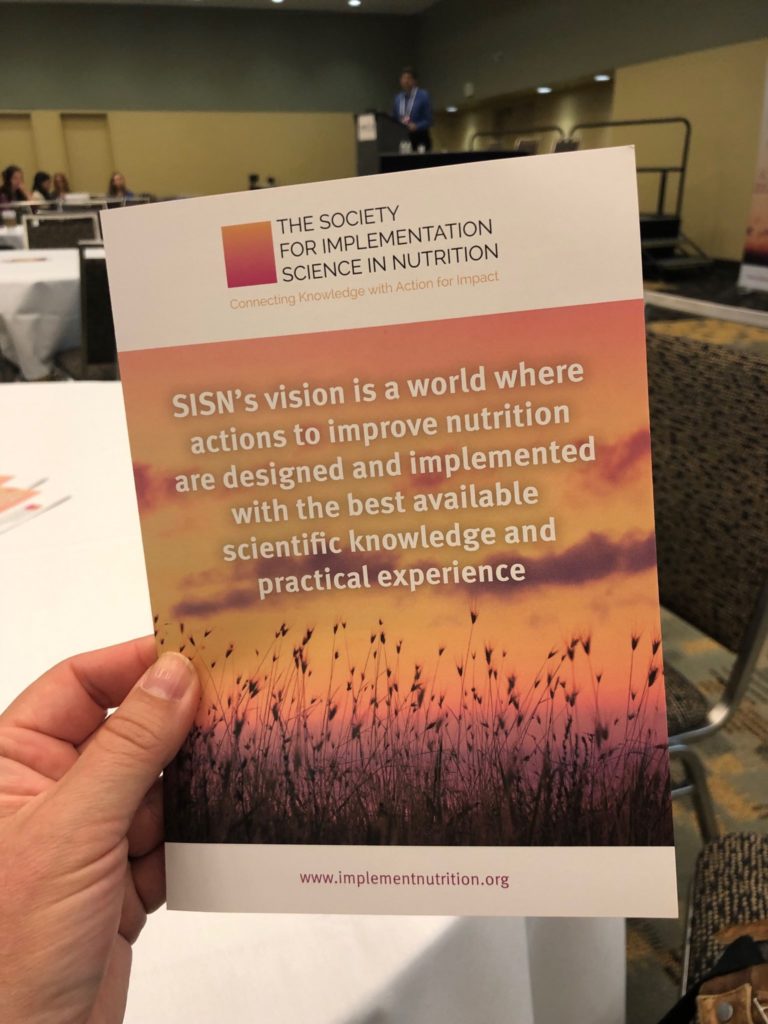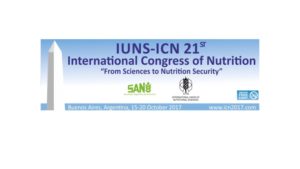How do we build and move the science of implementation forward?
The American Society of Nutrition held its annual meeting, Nutrition 2019, in Baltimore on June 8-11. On day 3, SISN facilitated a workshop on Implementation Science (IS). During the session, SISN Board Members guided the seventy attendees through a series of activities with the purpose of enhancing understanding of what IS is, its purpose in nutrition, and its relevance to their work.
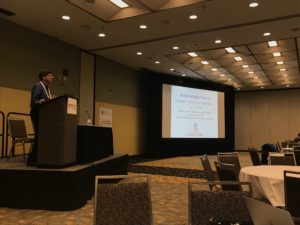 The workshop began with SISN’s Methods Councilor, Dr Ed Frongillo from the University of South Carolina, providing an introduction to IS, and background to the current work being completed by SISN to foster a systematic science around implementation in nutrition. Three speakers then shared their perspectives and experiences applying IS in their own contexts. Dr Karin Lapping described Alive and Thrive’s strategic use of IS to inform programs and policies to improve nutrition at scale. Dr Lynnette Neufeld from the Global Alliance to Improve Nutrition (GAIN) spoke about her experiences using implementation research (IR) to improve Opportunidades, a conditional cash transfer program in Mexico. Dr Rahul Rawat from the Bill and Melinda Gates Foundation, shared his thoughts on the importance of IS to the advancement of global nutrition agendas and some ideas on where IS should go as a field.
The workshop began with SISN’s Methods Councilor, Dr Ed Frongillo from the University of South Carolina, providing an introduction to IS, and background to the current work being completed by SISN to foster a systematic science around implementation in nutrition. Three speakers then shared their perspectives and experiences applying IS in their own contexts. Dr Karin Lapping described Alive and Thrive’s strategic use of IS to inform programs and policies to improve nutrition at scale. Dr Lynnette Neufeld from the Global Alliance to Improve Nutrition (GAIN) spoke about her experiences using implementation research (IR) to improve Opportunidades, a conditional cash transfer program in Mexico. Dr Rahul Rawat from the Bill and Melinda Gates Foundation, shared his thoughts on the importance of IS to the advancement of global nutrition agendas and some ideas on where IS should go as a field.
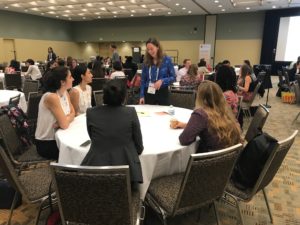 Attendees were then led into a small group discussion activity where they were asked to generate 3-5 examples of implementation-related challenges they had encountered and identify their learning needs to overcome these challenges. Each group nominated a scribe who documented the key points raised.
Attendees were then led into a small group discussion activity where they were asked to generate 3-5 examples of implementation-related challenges they had encountered and identify their learning needs to overcome these challenges. Each group nominated a scribe who documented the key points raised.
Following the lively discussions, SISN Councilor-at-large, Dr Andrea Warren from the University of South Carolina, presented three propositions aimed at providing a simple and not overly prescriptive way to articulate the value, significance, and uniqueness of IS in nutrition. This presentation was intended to generate discussion and feedback, which will be used to hone these ideas for a forthcoming publication.
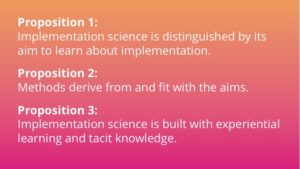
SISN’s Content and Communications Manager, Dr Naomi Cahill then summarized the challenges and learning needs that the attendees had collectively identified during the small group discussion activity. The identified challenges appeared to be related to three key areas or themes, namely 1) the system, 2) our understanding of IS/IR, and 3) interpersonal factors:
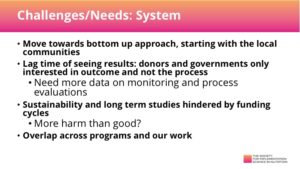
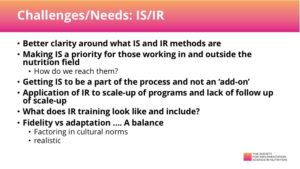
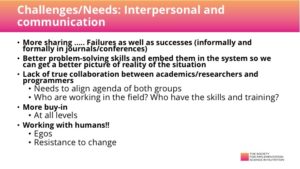
The workshop wrapped up with a consensus-building activity where attendees were asked to comment on the information that had been shared. In closing, Dr Ed Frongillo thanked attendees for their insightful contributions and concluded that:
1. There is mutual agreement and support for moving the science of implementation forward.
2. There is a need for more concrete examples of IR.
3. Those working in this space are encouraged to tell their stories and share their learnings, especially of failures.
4. There is a need to work on engaging and sharing knowledge across context and professional roles.
Have an idea or a comment on any of the issues discussed above? We welcome your feedback – you can comment on this post on our LinkedIn feed or write to us at info@implementnutrition.org.

This blog is brought to you courtesy of a grant from the Eleanor Crook Foundation.

